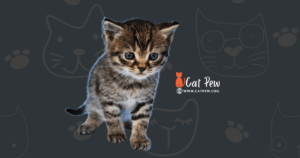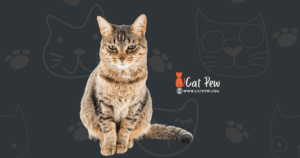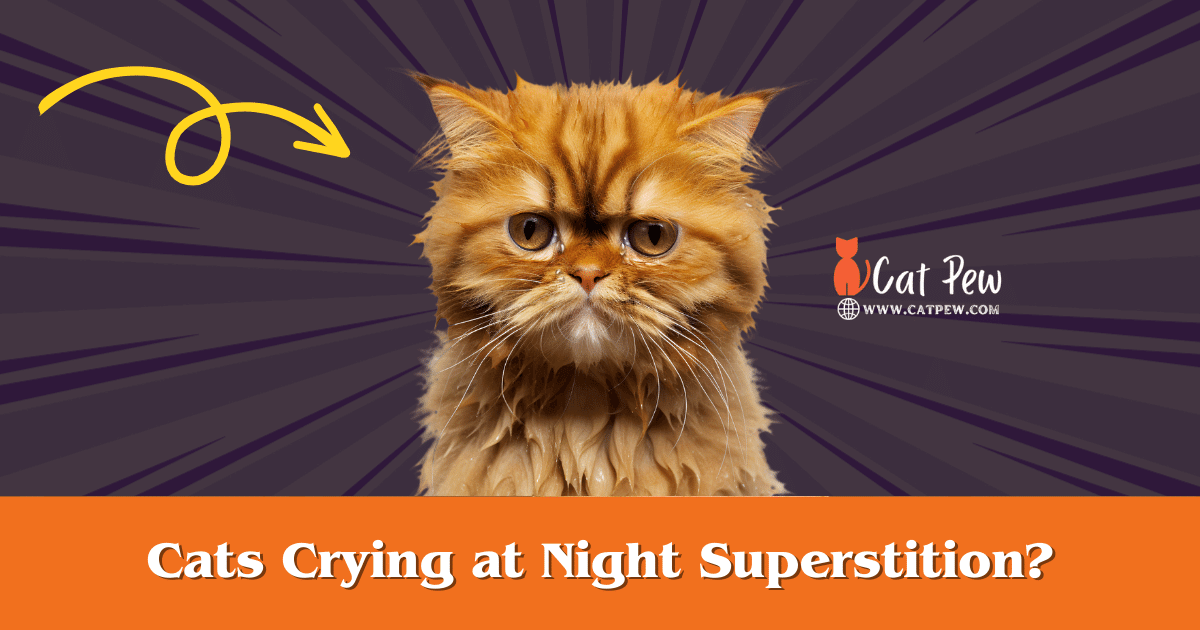Cats crying at night is often associated with superstitions.
The Origin Of Cats Crying At Night Superstition

Throughout history, cats have captivated our imagination and stirred our curiosity. One peculiar behavior that has perplexed humans for centuries is the infamous phenomenon of cats crying at night. This behavior has spawned various myths, superstitions, and cultural interpretations around the world. In this article, we will explore the historical beliefs surrounding cats’ nocturnal behavior as well as the diverse cultural interpretations that have emerged over time.
Historical Beliefs Surrounding Cats’ Behavior At Night
As cats are known to be primarily active during the night, it is no surprise that their activities during these nocturnal hours have been attributed to myths and superstitions. In ancient Egypt, for example, the Egyptians held cats in high regard and believed they were sacred animals. They believed that when cats cried at night, it was a sign of impending danger or misfortune. Seeing a cat cry was believed to be a warning that something calamitous was about to occur.
European folklore also has its fair share of beliefs surrounding cats crying at night. In medieval times, it was believed that the cries of a cat at night were a manifestation of a witch or evil spirits lurking nearby. The superstitious folk believed that if you encountered a crying cat during the night, it was best to avoid it, as it was a bad omen and could bring ill fortune.
Cultural Interpretations Of Cats Crying At Night
Across various cultures, cats crying at night have been associated with unique interpretations. In Japanese folklore, the sound of a cat crying at night is believed to be a warning of an imminent earthquake. This cultural interpretation stems from the belief that cats possess an innate ability to sense natural disasters, and their cries serve as a forewarning to humans.
In West African cultures, the crying of a cat at night is regarded as a sign that the spirit world is near. Cats are believed to have a strong connection to the spiritual realm, and their cries are seen as a communication or a message from the ancestors or deities. It is not uncommon for individuals in these cultures to pay heed to a cat’s cry and seek guidance from spiritual practitioners.
While these interpretations may vary across cultures and periods, one thing remains certain – the notion of cats crying at night holds a firm place in our collective consciousness. Whether we perceive it as a harbinger of doom or a messenger from the spiritual realm, the enigmatic behavior of cats has continued to captivate and intrigue us throughout history.
Scientific Explanation Of Cats Crying At Night
Have you ever wondered why your feline friend likes to serenade you with their haunting cries in the dead of night? While this behavior may seem mysterious and have you indulging in age-old superstitions, there is a scientific explanation behind why cats often cry at night. Understanding feline vocalizations and the common reasons behind this behavior can shed light on why your cat is filling the night air with plaintive cries.
Understanding Feline Vocalizations

Feline vocalizations are a form of communication that cats use to express their needs, desires, and emotions to humans and other cats. These vocalizations range from purrs and trills to hisses and growls, each serving a unique purpose. By deciphering the meaning behind their vocalizations, pet owners can gain valuable insights into their cat’s behavior and well-being.
Common Reasons For Cats Crying At Night
While every cat is unique and there may be various individual factors at play, there are some common reasons why cats tend to cry at night. Below are a few potential explanations:
- Attention-seeking: Cats are nocturnal creatures, and when the sun goes down, their instincts kick in. They may meow excessively to get your attention and engage you in play or provide you with companionship.
- Hunger or thirst: Cats have small stomachs, and their digestive systems process food quickly. If your cat hasn’t eaten for several hours, they may be crying to signal their hunger or thirst.
- Loneliness or anxiety: Cats are social animals, and some may experience separation anxiety when left alone during the night. Their cries may be an expression of their need for company or reassurance.
- Mating behaviors: Unneutered or unspayed cats may cry at night to attract potential mates. These vocalizations can be quite loud and persistent, often causing sleepless nights for both humans and nearby feline neighbors.
- Medical issues: Cats in pain or discomfort may vocalize more frequently, especially during the night when they have fewer distractions. If your cat’s crying behavior is sudden or accompanied by other concerning symptoms, it is essential to consult with a veterinarian to rule out any underlying health problems.
Understanding the common reasons behind your cat’s nocturnal cries provides valuable insights into their well-being. By addressing their needs and providing appropriate stimuli, you can help alleviate any distress or excessive vocalization during the night, creating a more peaceful environment for both you and your feline friend.
Superstitions Associated With Cats Crying At Night

Cats have long been associated with superstitions, and one particular belief that has persisted through the ages is the idea that their cries at night hold special meaning. From folklore and myths to cultural beliefs in different societies, the superstitions surrounding cats crying at night have ingrained themselves in various cultures around the world.
Folklore And Myths Linking Cat Cries To Omens
In many cultures, cats have been regarded as mystical animals, and their cries are often seen as an omen of good or bad fortune. According to ancient folklore and myths, cat cries at night can indicate impending tragedy or a warning from the spirit world. Some people believe that a cat crying at night signifies death or illness in the family, while others associate it with impending rain or bad weather. These superstitions have been passed down from generation to generation, adding to the mystique surrounding cats and their vocalizations.
Beliefs In Different Cultures Regarding Cat Cries
Across different cultures, the superstitions surrounding cats crying at night vary. In some regions, such as Japan, a cat’s cry at night is considered a sign of good luck and prosperity. It is believed that the cat’s voice carries positive energy and brings blessings to those who hear it. On the other hand, in Western cultures, the association is often more negative. Many people view a cat’s cry at night as an indicator of impending doom or misfortune. These conflicting beliefs showcase the diversity of superstitions and cultural interpretations of cat cries.
Another common belief is that cats cry at night when they are in pain or discomfort. While this is often a result of their natural nocturnal behavior or simply seeking attention, some cultures interpret it as a message from the spirit world. In these societies, it is believed that a cat’s cry is a plea for help or a warning of an impending danger. These interpretations further reinforce the connection between cats and the supernatural, intertwining their cries with the unseen forces that govern our lives.
Superstitions regarding cats crying at night have persisted for centuries, captivating the imagination and perpetuating beliefs that have influenced various aspects of human life. Whether seen as omens, messages from the spirit world, or simply a natural behavior, the mysterious cries of cats in the darkness continue to fuel superstitions and intrigue individuals across different cultures.
The Black Cat Superstition

Throughout history, black cats have captured the fascination of humans, both for their mysterious allure and the superstitions surrounding them. These feline creatures have been both revered and feared in various cultures, with countless beliefs woven around them. One such belief is the association between black cats and bad luck, which has been perpetuated over generations.
Associations Between Black Cats And Bad Luck
Black cats have long been associated with superstitions surrounding bad luck. In many cultures, the presence of a black cat crossing your path is considered an omen of misfortune. For centuries, they have been linked to witchcraft and sorcery, where they were thought to be the familiars of witches or even shape-shifted witches themselves. These beliefs contributed to the widespread fear and persecution of black cats during the medieval period.
Interestingly, the fear of black cats is not universal. In some cultures, such as the Japanese and the Scottish, black cats are considered symbols of good luck and prosperity. Nevertheless, the negative associations persist in many parts of the world, making black cats a subject of caution and suspicion.
Beliefs Linking Black Cats Crying At Night To Supernatural Occurrences
As if the superstitions surrounding black cats weren’t enough, there are also beliefs linking their cries at night to supernatural occurrences. According to folklore, it is believed that if a black cat cries at night, it signifies impending doom or death. This eerie notion has left many people feeling unsettled and wary of these nocturnal sounds.
However, it’s important to note that these beliefs are purely based on superstition and have no scientific basis. Cats cry for various reasons, such as hunger, discomfort, or even just seeking attention. Nighttime can magnify their vocalizations, making them more noticeable and potentially contributing to the superstitions surrounding black cats.
Despite the lack of evidence supporting the link between black cats crying at night and supernatural occurrences, the superstitions persist in many cultures. It’s fascinating how such beliefs can endure and shape our perception of these beautiful creatures.
Cats Crying As Predictors Of Death

One of the most enduring superstitions surrounding cats is their supposed ability to sense death. Many people believe that when a cat cries at night, it is a forewarning of an impending death. While this may seem purely superstitious, various interpretations of this behavior have been passed down through generations.
Superstitions Surrounding Cats’ Ability To Sense Death
Throughout history, cats have been worshipped, feared, and associated with mystical abilities. It is no surprise, then, that myths and superstitions have cropped up around their alleged sixth sense for death. Here are some common superstitions:
- Black cats crying at night bring bad luck and signify death.
- A cat sitting on the windowsill crying indicates that a death is imminent in the household.
- If a cat cries continuously for no apparent reason, folklore suggests that someone close to the family will soon pass away.
These superstitions highlight the deep-rooted beliefs people have regarding cats’ ability to sense death. While some may dismiss them as mere folklore, others still hold onto these beliefs.
Interpretations Of Cats Crying Before A Death Occurs
While the superstitions surrounding cats’ cries at night may be intriguing, various interpretations of this behavior go beyond the supernatural. Here are a few possible explanations:
- Medical issues: Cats, like humans, can experience various health problems, including pain and discomfort. If a cat is crying at night, it may be a sign of an underlying medical issue or pain.
- Environmental factors: Cats are highly sensitive to changes in their environment. Loud noises, unfamiliar scents, or disturbances in their routine can cause them to cry. These changes may coincide with a death in the family, giving rise to the superstition that the cat is sensing it.
- Seeking attention: Cats are known for their independent nature, but they still seek attention and affection from their human companions. If a cat feels neglected or is craving attention, it may cry at night as a way of getting its owner’s attention.
These interpretations offer a more rational perspective on why a cat may cry at night before a death occurs. While the connection between a cat’s behavior and impending death may be coincidental, it is a belief that continues to intrigue and captivate cat owners and enthusiasts alike.
Cats As Harbingers Of Misfortune

Cats crying at night have long been associated with superstitions of misfortune, sending shivers down the spines of those who believe in the eerie tales. With countless stories floating around, these feline harbingers of misfortune continue to captivate our imagination.
Superstitions Connecting Cats Crying At Night With Misfortune Or Disaster
Throughout history, cats have been surrounded by a variety of superstitions and beliefs. It is no wonder that their enigmatic behavior, especially crying at night, has also given rise to several superstitions linking them with misfortune or disaster. Such beliefs have been passed down from generation to generation, and ingrained in cultures around the world. Let’s delve deeper into these intriguing superstitions and explore the possible reasons behind them.
Historical Events Reinforcing These Superstitions
The superstitions connecting cats crying at night with misfortune or disaster have roots in various historical events that have occurred over time. From ancient civilizations to medieval times, cats were often perceived as mysterious creatures associated with supernatural powers. Their behavior was believed to hold deep meaning and foreshadow future events.
One such historical event is the Black Death epidemic that ravaged Europe in the 14th century. During this catastrophic time, it was observed that many cats cried incessantly at night, especially in areas where the disease was prevalent. This led people to believe that these feline cries were an omen of impending doom. The association between cats crying at night and calamity was further reinforced when the disease spread rapidly, leaving devastation in its wake.
In addition, ancient Egyptian mythology also contributed to the superstitions surrounding cats. Egyptians believed that cats possessed a special connection with the spiritual realm and were able to communicate with otherworldly beings. It was believed that when a cat cried at night, it was communicating with the spirits or foretelling an imminent tragedy.
Superstitions Passed Down Through Generations
These superstitions have been passed down through generations, becoming ingrained in various cultures around the world. Here are a few examples of some common beliefs:
- In Korean folklore, it is believed that a cat crying at night is a sign that evil spirits are lurking nearby.
- In certain parts of Russia, people believe that a cat crying at night indicates an impending death in the family.
- In Japanese superstition, a cat crying at night is seen as a harbinger of an earthquake.
- In Scottish folklore, it is believed that if a cat cries beneath a sick person’s window, it signifies that they will not recover.
While these superstitions may vary from culture to culture, they all share a common thread – the notion that a cat crying at night is a foreboding omen of misfortune or tragedy.
Superstitions and beliefs surrounding cats crying at night continue to captivate our imaginations, adding an air of mystery to these beloved feline companions. Whether you dismiss them as mere folklore or cautiously heed their warnings, the enduring nature of these superstitions reveals the deep-seated human fascination with the enigmatic ways of these mesmerizing creatures.
Debunking The Superstitions

If you’re a cat owner, you’ve probably experienced those mysterious late-night cries coming from your furry companion. While superstitions surrounding cats crying at night have been around for centuries, it’s time to debunk those myths and explore the scientific explanations behind this behavior. In this article, we’ll delve into the various factors that can influence a cat’s nocturnal vocalizations, separating fact from fiction.
Scientific Explanations For Cats Crying At Night
1. instinct: Cats are crepuscular animals, which means they are most active during dawn and dusk. During the night, their hunting instincts may kick in, leading to increased vocalizations as they mimic the calls of their wild ancestors.
2. Environmental factors: Cats are highly sensitive to changes in their environment. Noises from outside, such as cars passing by or other animals roaming, can trigger their vocalizations. They might also cry if they feel lonely or insecure, seeking attention and comfort.
3. Medical concerns: Excessive crying at night can sometimes be a sign of an underlying health issue. Cats experiencing pain or discomfort due to conditions like arthritis, dental problems, or digestive disorders may vocalize more frequently. It’s always advisable to consult a veterinarian if you notice a sudden change in your cat’s behavior.
Debunking Common Myths And Misconceptions Surrounding Cat Cries
1. Cats cry at night because they’re trying to communicate with ghosts: This superstition is far from the truth. Cats’ vocalizations are a form of communication, but it’s usually directed towards their human owners or other animals. They might be expressing their needs, seeking attention, or even trying to warn us of potential dangers.
2. Cat crying brings bad luck: This belief is purely superstitious and has no basis in reality. Cat vocalizations are natural behaviors that can be influenced by various factors mentioned earlier. The cries themselves do not have any magical or negative connotation.
3. Cats cry at night because they’re chasing away evil spirits: While cats might display territorial behaviors, their vocalizations at night are not related to any spiritual battles. Cats crying can be attributed to their instincts, biological rhythms, or external stimuli in their environment.
By understanding the scientific explanations and debunking these superstitions, we can provide a more accurate understanding of why cats cry at night. It’s important to create a safe and stimulating environment for our feline friends, ensuring their physical and emotional well-being.
Cats’ Communication Through Vocalizations

When it comes to cats, their vocalizations play a crucial role in expressing their needs and emotions. Understanding these vocalizations is essential for cat owners to effectively communicate with their furry companions. From gentle purring to loud cries, cats have a wide range of sounds that serve as a means of expression.
Understanding Different Types Of Cat Vocalizations
Cats communicate through various vocalizations, each having its unique meaning. By learning to recognize these sounds, cat owners can better understand what their feline friends are trying to convey. Here are some common types of cat vocalizations:
| Vocalization | Meaning |
|---|---|
| Purring | Purring is typically associated with contentment and relaxation. Cats often purr when they are being petted or feel comfortable in their environment. |
| Meowing | Meowing is a versatile vocalization that cats use to communicate various messages. It can indicate hunger, a desire for attention, or even a greeting. |
| Hissing | Hissing is a warning sound that cats use to express their discomfort or fear. It serves as a signal for other animals or humans to give them space. |
| Chirping | Chirping is a unique vocalization that cats often make when they are excited or observing prey. It mimics the sound of birds and is commonly seen when cats are looking out of a window. |
Exploring The Meanings Behind Specific Cat Cries
Cats crying at night can be attributed to various reasons, and understanding the meanings behind these cries can help cat owners address their feline’s specific needs. Here are some common reasons behind specific cat cries:
- Hunger: Cats may cry at night if they are hungry and require a meal. Ensuring they have access to food before bedtime can help alleviate this issue.
- Attention: Some cats cry at night to seek attention from their owners. Spending quality time with your cat and providing them with interactive toys can help fulfill their need for stimulation.
- Territoriality: If cats feel threatened or if there are other animals in the vicinity, they may cry at night to mark their territory and establish their presence.
- Medical issues: Cats in pain or discomfort may cry at night as a way of expressing their distress. If your cat’s crying seems excessive or out of the ordinary, it’s crucial to consult a veterinarian to rule out any underlying medical conditions.
In conclusion, cats’ vocalizations serve as a powerful communication tool, allowing them to express their needs, emotions, and warnings. By understanding the different types of vocalizations and exploring the meanings behind specific cat cries, cat owners can establish a stronger bond with their feline companions and ensure their well-being.
Nighttime Activity Of Cats

Have you ever been awakened in the middle of the night by the haunting cry of a cat? The night can be a time of mystery and superstition, and cats seem to embody this nocturnal allure. Many cat owners have experienced their feline companions being particularly active during the late hours, engaging in a range of behaviors that can leave us both fascinated and puzzled. In this article, we will explore the natural behaviors of cats during the night and the reasons why they may become more active after the sun goes down.
Natural Behaviors Of Cats During The Night
Despite their domestication, cats retain many of their inherent instincts as nocturnal hunters. Much like their wild counterparts, domestic cats have a natural inclination to be more active during the twilight hours. Their acute senses, such as sharp night vision and heightened hearing, are honed for tracking prey in low-light conditions. These senses allow them to navigate their surroundings deftly and remain alert to any potential threats or food sources. While some cats may sleep peacefully through the night, others are known to engage in a variety of activities that mirror their wild instincts.
Reasons Why Cats May Become More Active At Night
Several factors contribute to a cat’s increased activity during the night. One significant reason is the absence of daylight, which can stimulate their hunting instincts. Additionally, cats are crepuscular animals – meaning they are naturally most active during dawn and dusk. This behavior pattern is a result of ancestral habits when their prey was most active. The cover of darkness also provides cats with a sense of security and privacy, allowing them to explore their surroundings more freely without the presence of larger predators.
Another reason for their nighttime activity may be related to their sleeping patterns. Cats are known for their ability to have several short sleep cycles throughout the day. While their human counterparts usually have a consolidated sleep schedule, cats tend to take multiple naps and shorter periods of sleep. This polyphasic sleep pattern enables them to be more active during the night, as they are naturally programmed to awaken, stretch their legs, explore, and engage in grooming rituals. It’s their way of expending energy and staying mentally stimulated, ready for any potential hunting opportunities that may arise.
Additionally, certain environmental factors can contribute to a cat’s nighttime restlessness. For instance, changes in the household routine or the introduction of a new family member, whether human or animal, can disrupt their sense of security and cause them to seek reassurance during the night. This behavior is often exhibited through excessive vocalization, including crying, meowing, or even yowling. Addressing these underlying anxieties can help restore their sense of peace and tranquility.
As cat owners, it is important to understand and respect the natural rhythms of our feline friends. While their nighttime activities may sometimes disrupt our sleep, it is vital to provide an environment that allows them to express their natural behaviors while also ensuring our restfulness. By accepting and accommodating their instinctual needs, we can foster a harmonious coexistence with our nocturnal companions.
Health Issues Affecting Cats’ Behavior

When it comes to our feline friends, it’s not uncommon for them to exhibit bizarre behaviors that often leave us scratching our heads in confusion. One puzzling behavior that many cat owners have experienced is their cats crying at night. This superstition has been debated for centuries, but did you know that health issues could be the culprit behind this nocturnal symphony?
Medical Conditions That Can Cause Cats To Cry At Night
Several medical conditions can contribute to a cat’s nighttime cries. These conditions may cause discomfort or pain, leading your furry friend to vocalize their distress. Some common health issues that can affect a cat’s behavior include:
| Medical Condition | Symptoms |
|---|---|
| Urinary tract infection (UTI) | Increased frequency of urination, straining during urination, blood in urine |
| Arthritis | Limping, difficulty jumping, stiffness |
| Dental problems | Bad breath, drooling, loss of appetite |
| Hyperthyroidism | Weight loss, increased appetite, restlessness, diarrhea |
| Separation anxiety | Persistent meowing, destructive behavior, excessive grooming |
How To Identify And Address Health-related Concerns
Identifying and addressing health-related concerns is crucial in ensuring your cat’s well-being and peace of mind for both you and your feline companion. Here are some steps you can take to tackle these concerns:
- Observe your cat’s behavior: Pay attention to any changes in your cat’s behavior, such as increased vocalization, decreased appetite, or changes in litter box habits.
- Consult a veterinarian: If you suspect your cat’s cries are due to health issues, it’s important to seek professional advice. A veterinarian will be able to perform a thorough examination and run necessary tests to identify any underlying medical conditions.
- Treat the underlying condition: Once the cause of your cat’s cries has been identified, your veterinarian will recommend a suitable treatment plan. This may involve medication, dietary changes, or other interventions depending on the specific condition.
- Create a comfortable environment: Provide your cat with a cozy and safe space to alleviate any anxiety or discomfort. This can include a warm bed, scratching posts, and plenty of mental stimulation.
Remember, it’s always better to be safe than sorry when it comes to your cat’s health. By addressing any health-related concerns, you can help ensure your cat’s happiness and minimize those midnight serenades.
Tips For Dealing With Cats Crying At Night

Is your feline friend keeping you up at night with their constant crying? You’re not alone! Many cat owners experience the frustration of their beloved pets meowing and yowling in the wee hours of the morning. In this article, we will explore some tips and techniques to help you address the issue of cats crying at night and ensure restful sleep for both you and your furry companion.
Creating A Comfortable Sleep Environment For Your Cat
Just like humans, cats need a comfortable and inviting sleep environment to have a restful night. Making a few adjustments to your cat’s sleeping quarters can make a big difference in reducing nighttime crying episodes. Here are some ideas to consider:
- Provide a cozy sleeping spot: Cats love to curl up and feel secure when they sleep. Make sure your cat has a soft and comfortable bed or blanket to snuggle into.
- Place the bed in a quiet area: Cats are sensitive to noise and disruptions during sleep. Find a quiet spot in your home, away from high-traffic areas, where your cat can sleep undisturbed.
- Ensure proper temperature: Cats have their temperature preferences just like us. Keep the sleeping area warm in winter and cool in summer, so your cat stays comfortable throughout the night.
- Offer familiar scents: Cats find comfort in familiar scents. Consider placing an unwashed item of your clothing near their bed to provide a soothing scent that reminds them of you.
Behavioral Techniques To Help Discourage Nighttime Crying
While creating a comfortable sleep environment is important, addressing the underlying behavioral causes of nocturnal crying can also be beneficial. Here are some techniques to discourage nighttime crying in cats:
- Stick to a routine: Cats thrive on routine, so establish a consistent sleep schedule for your feline friend. Regular feeding and playtime before bed can help tire them out and encourage them to sleep through the night.
- Avoid attention reinforcement: It’s natural to want to comfort your crying cat, but be mindful not to reinforce their behavior by giving them attention. Instead, wait for a moment of silence before providing comfort or treats.
- Engage in interactive play: Cats are naturally active animals. Spend quality time playing with your cat during the day to help release their pent-up energy. A tired cat is more likely to sleep peacefully at night.
- Investigate any underlying health issues: Cats may cry at night due to discomfort or pain caused by an underlying medical condition. If your cat’s crying persists or worsens, it’s essential to consult a veterinarian to rule out any health problems.
- Consider pheromone therapy: Pheromone diffusers or sprays can help alleviate anxiety in cats, which can be a cause of nighttime crying. These products mimic natural feline pheromones and promote a sense of calm and security.
By creating a comfortable sleep environment for your cat and using behavioral techniques to discourage nighttime crying, you can help restore peaceful nights and ensure a happier, well-rested cat. Remember, patience and consistency are key in addressing this issue, so don’t give up if immediate results are not seen. With time and effort, you and your cat will enjoy restful nights together.
Establishing A Consistent Routine

Establishing a consistent routine can help address the superstition of cats crying at night. By creating a structured schedule, cats feel secure and their behavior may improve, reducing nighttime vocalizations.
Importance Of A Structured Schedule For Cats
Just like humans, cats also thrive on routine and structure. A consistent schedule not only helps them feel secure but also aids in reducing anxiety and stress levels. When it comes to cats crying at night, establishing a structured routine can be key to finding a solution. By focusing on creating a consistent schedule for your feline friend, you can help them regulate their internal clock and minimize nighttime disturbances.
Tips For Creating A Calming Bedtime Routine For Your Cat
Creating a calming bedtime routine for your cat can not only help reduce their nighttime cries but also promote a sense of overall well-being. Here are some tips to consider:
- Set a consistent feeding schedule: Cats are creatures of habit and thrive on routine. Establish regular meal times that align with your cat’s instincts and provide adequate nourishment to keep them satisfied throughout the night.
- Provide mental and physical stimulation: Engage your cat in playtime and interactive toys to help expel excess energy. This will not only tire them out but also encourage more restful sleep.
- Create a cozy sleep environment: Ensure your cat has a comfortable and quiet space to rest. Consider providing a cozy bed or blanket and make sure their sleeping area is free from any disturbances or loud noises.
- Establish a pre-bedtime routine: Cats are creatures of habit and enjoy predictability. By establishing a consistent pre-bedtime ritual, such as brushing their fur or engaging in a gentle petting session, you can signal to your cat that it’s time to wind down.
- Provide calming scents: Cats are sensitive to smells, and certain scents can have a calming effect on them. Consider using products that contain calming pheromones or diffusing lavender essential oil in your cat’s sleeping area to create a soothing ambiance.
- Keep a structured sleep schedule: Cats are crepuscular animals, meaning they are most active during dawn and dusk. Try to align your cat’s sleep schedule with their instincts by providing a structured sleep routine that includes consistent bedtimes and wake-up times.
By adhering to these tips, you can create a calming bedtime routine for your cat, promoting a sense of security and reducing nighttime disturbances. Remember, it may take some time for your cat to adjust to the new routine, so be patient and consistent in your efforts. By providing structure and stability, you can help alleviate your cat’s nighttime cries and ensure a peaceful night’s sleep for both you and your feline companion.
Providing Adequate Stimulation And Enrichment

Having a cat crying at night can be quite unsettling, especially if it becomes a regular occurrence. While there may be various reasons for this behavior, one common approach to help alleviate this issue is by providing adequate stimulation and enrichment for your feline friend. Cats, known for their curious and playful nature, thrive when engaged in activities that keep their minds and bodies active.
Interactive Toys To Keep Your Cat Engaged:
Interactive toys can be a fantastic way to keep your cat engaged and entertained, especially during the night when they may experience bouts of restlessness. These toys are designed to stimulate your cat’s natural hunting instincts, providing both mental and physical exercise. Consider investing in interactive toys such as puzzle feeders, treat-dispensing toys, or toys with hidden compartments. These innovative playthings will not only keep your cat occupied but also offer mental stimulation as they figure out how to retrieve their treat or toy.
Mental And Physical Exercise For Your Cat During The Day:
It’s important to remember that cats are crepuscular animals, meaning they are most active during dawn and dusk. By ensuring your cat gets sufficient exercise during the day, you can help address any pent-up energy that may contribute to their nighttime restlessness. Engage your cat in interactive play sessions using toys such as wand toys, laser pointers, or feather toys. Creating a regular exercise routine will not only provide physical exertion but also mental engagement, helping to tire out your feline companion by nightfall.
Here are a few ideas to incorporate mental and physical exercise into your cat’s daily routine:
- Set up a dedicated play area with climbing structures and scratching posts to encourage natural behaviors and provide opportunities for exercise.
- Rotate toys regularly to keep your cat’s interest piqued and prevent boredom.
- Hide treats or toys around the house for your cat to discover, stimulating their natural hunting instincts.
- Consider incorporating puzzle toys or food-dispensing toys into their mealtime routine to make mealtime more stimulating.
- Provide opportunities for your cat to explore the outdoors safely, such as supervised outdoor play or creating a secure outdoor enclosure.
By providing adequate stimulation and enrichment, you can help ensure that your cat has a fulfilling and satisfying day, reducing the chances of nighttime restlessness and excessive crying. Remember to observe your cat’s behavior and adjust their enrichment activities accordingly, as each cat is unique and may have different preferences. With a well-stimulated and engaged feline companion, you are more likely to enjoy peaceful nights and a harmonious household.
Seeking Veterinary Assistance

When your cat starts crying excessively at night, it is important to seek veterinary assistance to identify and address any underlying issues. While some level of meowing is normal for cats, persistent night crying can be a sign of distress or discomfort. Consulting with a veterinarian can help determine the cause and provide appropriate interventions. In this section, we will discuss when to consult a veterinarian about excessive crying and potential medical interventions for cats with persistent night crying.
When To Consult A Veterinarian About Excessive Crying
If your cat’s nighttime crying is becoming more frequent, intense, or disruptive, it is time to consult a veterinarian. While occasional meowing is generally harmless, persistent night crying can indicate an underlying medical condition or behavioral issue that requires attention. By seeking veterinary assistance, you can rule out any medical problems and ensure your beloved feline friend receives the necessary care.
Here are some signs that indicate it’s time to consult a veterinarian:
- Increased and prolonged meowing during the night
- Changes in your cat’s eating or drinking habits
- Noticeable weight loss or gain without a change in diet
- Decreased activity levels or lethargy
- Excessive grooming or scratching
- Behavioral changes such as aggression or avoidance
Potential Medical Interventions For Cats With Persistent Night Crying
Once you consult a veterinarian about your cat’s excessive crying at night, they will conduct a thorough examination to determine the possible medical causes. They may recommend specific interventions based on their findings, which can help address the issue.
Here are some potential medical interventions that your veterinarian may suggest:
- Medication: In certain cases, your veterinarian may prescribe medication to alleviate any underlying physical or psychological issues causing your cat’s nighttime crying.
- Dietary changes: Diet plays a crucial role in a cat’s overall health. Your veterinarian may suggest dietary modifications or the addition of specific supplements to improve your cat’s well-being and reduce nighttime meowing.
- Behavioral therapy: In instances where the nighttime crying is due to stress, anxiety, or other behavioral issues, your veterinarian may recommend behavioral therapy. This may involve environmental enrichment, training, or soothing techniques to help your cat feel more secure and relaxed.
- Medical procedures: In certain circumstances, medical procedures may be necessary to address the cause of your cat’s excessive crying. These procedures could include surgeries or treatments for conditions such as urinary tract infections or hormonal imbalances.
In conclusion, reaching out to a veterinarian is crucial when your cat’s nighttime crying becomes excessive. By seeking veterinary assistance, you can determine the underlying cause and explore potential medical interventions that can improve your cat’s well-being and bring peace to your nights together.
Frequently Asked Questions On Cats Crying At Night Superstition?
Why Do Cats Cry At Night?
Cats may cry at night due to various reasons, such as seeking attention, mating behavior, boredom, hunger, or medical issues. Understanding the underlying cause and addressing it can help alleviate the night cries and ensure your cat’s well-being.
Is It Normal For Cats To Cry At Night?
While some crying at night is common in cats, excessive or sudden night crying may indicate discomfort or distress. It is essential to observe your cat’s behavior, check for any underlying health issues, and provide a comfortable environment to promote restful sleep.
How Can I Stop My Cat From Crying At Night?
To address night crying in cats, establish a consistent feeding and play schedule, provide mental and physical stimulation during the day, ensure a comfortable sleeping area with familiar scents, and consult a veterinarian to rule out any medical causes. Gradually introducing a bedtime routine can also help calm your cat at night.
What Are Some Common Reasons For Cats Crying At Night?
Common reasons include loneliness, boredom, hunger, attention-seeking behavior, or changes in routine.
Can Superstitions Explain Why Cats Cry At Night?
Some people believe that cats crying at night are a superstition related to bad luck or impending doom, but there’s no scientific evidence to support this.
Can Older Cats Develop Nighttime Crying Behavior?
Yes, older cats may experience cognitive dysfunction or age-related anxiety, leading to increased vocalization at night.
Should I Ignore My Cat When It Cries At Night?
Ignoring your cat’s cries may lead to increased anxiety and stress, so it’s important to address the underlying cause instead.
Conclusion Of Cats Crying at Night Superstition
To sum up, the superstition surrounding cats crying at night has been ingrained in many cultures for centuries. While some believe it to be an omen of impending doom or bad luck, there is no scientific evidence to support such claims.
Cats, like humans, can also vocalize for various reasons such as attention-seeking, mating calls, or simply communicating their needs. Instead of attributing supernatural significance to their night-time cries, it is advisable to observe their behavior and ensure their well-being is met.
Understanding our feline friends can help dispel unfounded beliefs and foster a healthier relationship with them.

Winston
I'm Winston, the author of this feline-focused (Catpew.com) blog . My love for cats goes back to my childhood, when I spent countless hours playing with my family's tabby, Mittens. This furry friend instilled in me a deep appreciation for the unique personalities, playful nature, and unconditional love that cats offer.

